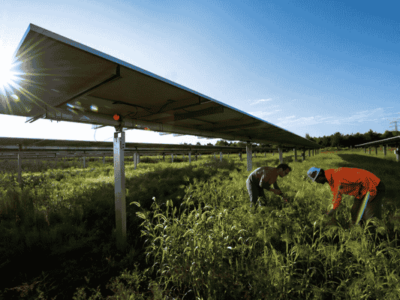Colorado — The U.S. Department of Energy’s (DOE’s) National Renewable Energy Laboratory (NREL) announced a new initial memorandum of understanding (MOU) with the global company UL to work toward further developing and commercializing the Solar Automated Permit Processing Plus (SolarAPP+) software that will automate the permitting process for residential solar systems.
The use of SolarAPP+ so far has enabled local governments to cut down on the time required to grant a permit from a national average of five business days to zero.
SolarAPP+ expedites the solar permitting process by making it easier for local governments to determine whether a proposed residential solar system is compliant with safety and code standards. If it is, SolarAPP+ will approve the design and issue a permit instantly. If not, SolarAPP+ will decline the application and indicate the issues for the contractor to resolve. Quickly processing standard rooftop solar applications will increase local governments’ abilities to handle high volumes of permits more efficiently as demand for solar increases across the country.
“This collaboration with UL is a critical first step in meeting our vision to deliver instant permitting nationwide,” said Jeffrey Cook, NREL’s lead developer of SolarAPP+. He said the goal is to have the software used to cover 90% of all residential solar and solar-plus-storage permits by 2030.
“UL’s extensive code-related experience in the solar market drove our decision to partner with them,” Cook said. “Their credibility with installers, customers, and local governments will help us build a scalable product, while instilling local government confidence in the automated code compliance checks at the heart of the application.”
Late last year, NREL released the pilot version of the free SolarAPP+ software to help reduce the time and cost of local government permitting and support faster deployment of residential solar. Safety is a key consideration of local governments—the permitting process includes an evaluation of the system for its code compliance with international model codes including the 2017 National Electrical Code.
DOE-funded the development of SolarAPP+, and a coalition of stakeholders including the International Code Council, National Fire Protection Association, International Association of Electrical Inspectors, local governments, and the solar industry are helping to develop the software and engage local governments in its adoption.
“We are committed to innovative ways to build confidence in renewable energy solutions,” said Ken Boyce, senior director of principal engineering at UL. “We recognize the value SolarAPP+ brings to governments, the solar industry, and the public, and we look forward to supporting jurisdictions in establishing access to safe solar energy technologies for their residents.”
NREL has committed to adding new features to SolarAPP+ until March 2023, when it is anticipated that UL will take over management and deployment of the software with code organizations, the SolarAPP+ coalition, and related stakeholders. UL also plans to work to create new features that expand the scope to other clean energy technologies and installation scenarios in accordance with an NREL license agreement.
NREL is the U.S. Department of Energy’s primary national laboratory for renewable energy and energy efficiency research and development. NREL is operated for the Energy Department by the Alliance for Sustainable Energy, LLC.














Comments